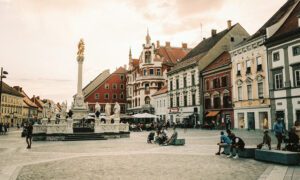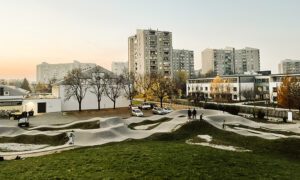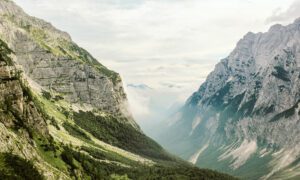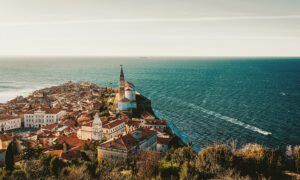May 28, 2023
God Creating Beauty in His Time
When my parents visited me in Slovenia, my Dad was surprised by how architecturally impressive and historic the capital city of Ljubljana is, and that it ranks as a tourist destination among other notable European cities.
Slovenia is a beautiful country, and Slovenes are beautiful people. Economically and politically, Slovenia is not your “average Eastern European country,” as you might imagine. It is very much Central Europe. In other words, it gets “the best” of both the Eastern and Western European worlds. Slovenia joined the EU in 2004. The Slovene people did not suffer under the fear-inducing Soviet version of communism, as many other countries in Central Europe did. They were part of Yugoslavia, which took what it needed to survive as a small communist/socialist country between two big giants fighting for power and influence in this region: the USA and the USSR. And before that, they benefited economically and architecturally under the Habsburg monarchy (which later became the Austro-Hungarian monarchy) but suffered spiritually and socially under their oppressive counter-reformation and corrupt leadership.
Their history is full of power struggles and oppression with Italy, then the World Wars, the formation of Yugoslavia, etc. (For further learning, I recommend BBC’s “The Death of Yugoslavia,” a 6-part docuseries, as an excellent place to start.)

Slovene schools only teach a little about recent history, because there are still questions about what exactly happened and who is loyal to whom— which could cause trouble in modern-day classrooms and communities. Slovenia is a mixture of a diverse history of external oppression and occupation, internal corruption, beautiful poetic expression, the wealth of the Roman Catholic Church, simple farms and families, and people who enjoy nature, hiking, organization, and food.
You could say they are a small melting pot of their own, due to immigration from those who fled the Balkan Wars and corruption for a better life or for work— without having to “leave the Balkans” in terms of a Serbo-Croatian language and a familiar people group. For example, the pump track, where I do evangelistic outreach, is comprised mainly of Muslim immigrants from Bosnia and Herzegovina. Many of my Slovene friends also have family roots in Croatia and Serbia.

Slovenes also have some of the best athletes in the world, especially in winter sports. With only a population of 2 million people, they had 42 competitors in 6 sports at the 2022 Winter Olympics with seven medals. On account of the USA’s 224 competitors and 25 medals, many of my Slovene friends remind me that the population to medal ratio favors them significantly. And their disposition toward winter sports is no surprise because they have the Julian Alps in their backyard. These Slovene mountains are the 9,395 ft (at their peak) “foothills” of the great European Alps that stretch across Austria, Italy, and Switzerland. In their public school system, classes take a week each year to go to “Šola v naravi,” meaning “school in nature.” For middle schoolers, this includes a week of skiing or snowboarding. Most Slovenes have been skiing since they were four years old.

Slovenes have long been driven by a fierce desire for due respect and recognition for their excellence and equality among other countries, athletes, and companies. Luka Dončić (Basketball player for the Slovene National team and the NBA Dallas Mavericks) is a national hero and role model. He’s featured on many Slovene billboards for a favorite local snack, spreadable chicken. Luka grew up across the street from my old apartment building. Slovenes are proud of their education system, built not on critical thinking like ours once was but on discipline, dedication, and rote memorization. The knowledge, work ethic, respect for authority, and ability to “get the job done” are always surprising and impressive to me in the young adults we work with. Our Josiah Venture team’s American values and skills of creativity and critical thinking complement our Slovene counterparts nicely when working together on mission.
Don’t let the landscape and beautiful buildings (old and new) fool you, though; as excellent as the Slovene alps, athletes, or economic standing is, Slovenes need the gospel and goodness of God as much as anyone else. Among the youth, Slovenia has one of the highest suicide rates in the world. Loneliness, anxiety, depression, fear, idolatry, broken families and systems, bitterness and unforgiveness in relationships, and many other effects of “the fall” have corrupted and stolen peace and life from these wonderful people. As we all have, they’ve taken up arms and strategies to survive and cope with this harm and pain in ways that disregard God, are self-sufficient and self-gratifying at the expense of others, lead to further damage, and go against God’s good design for our flourishing.
Unsurprisingly, however, the story of redemption that God is working out in this place has a beautiful scenic backdrop. This, to me, points to the fact that his fingerprints are all over this place, and that his heart is for Slovenes to know hope and have significance in this life that is deeper and grander than themselves. The beauty of Slovenia is evidence that God is present and working in the background to bring about his good will and purposes here in Slovenia, as it is in Heaven.

Most Slovenes have heard about God through the Catholic church and their grandparents; however, most don’t practice Catholicism (aside from traditional baptisms or Easter visits for the grandparents). Many have been turned against religion entirely by the legalistic works-based gospel they were taught and the “authoritarian impossible to please God” presented to them and passed down in their family history.
Please pray with us: let it not be so—instead, as the Slovene Reformer Primož Trubar wrote in 1550, “May all Slovenes know grace, peace, mercy, and true knowledge of God through Jesus Christ.”
Will you join me in praying that God returns to these seeds of the gospel of his Kingdom that were planted here so many years ago? Pray that God reveals the true nature of His character to many Slovenes, that he is not like the emotionally absent dads they grew up with. He is not the shaming or harshly authoritarian school teachers who ridicule them for making mistakes and asking questions. His presence is unlike the isolation and accusations accompanying chronic mental health challenges. He’s unlike the monotony of the daily grind or the structure or system in which they might feel stuck or content to be lifelessly safe and average. He doesn’t operate in the retributive social system where neighbors must return a favor and make up for mistakes to earn good standing.
Instead, may Slovenes know the LORD, our God, who is “a God merciful and gracious, slow to anger, and abounding in steadfast love and faithfulness, keeping steadfast love for thousands, forgiving iniquity and transgression and sin…” (Exodus 34:6-7 ESV). May they know his healing touch in these historical wounds of oppression and control. May they experience the goodness of their Father who draws near, full of compassion and understanding, and our brother and friend Jesus, who weeps with us, who became like us and took on our pain and suffering, and who knows what it’s like to be limited and weak. He’s familiar with affliction under controlling authorities. He’s faithful and just. He eagerly covers our mistakes. He doesn’t shut us down but redirects us toward himself and, by his Holy Spirit, inspires curiosity and wonder. He encourages and empowers our growth to become like him, to be transformed into the image of His Son, for our flourishing, for the sake of others around us, and for His glory. And he is making all things new.
Pray with us that God continues to make Slovenia beautiful; not just in her landscape, but deeply in the hearts of the Slovene people. Pray that they’d all be healed, filled, and transformed to reflect the values of the Kingdom and the goodness of God. Pray for people to be free to live according to God’s will, to love God, and to love their neighbors, in Jesus’ name!





